Unit 5 Into the wild Using ideas 课件(共39张,内嵌音频)-高中英语外研版(2019)必修第一册(共37页PPT)
文档属性
| 名称 | Unit 5 Into the wild Using ideas 课件(共39张,内嵌音频)-高中英语外研版(2019)必修第一册(共37页PPT) | 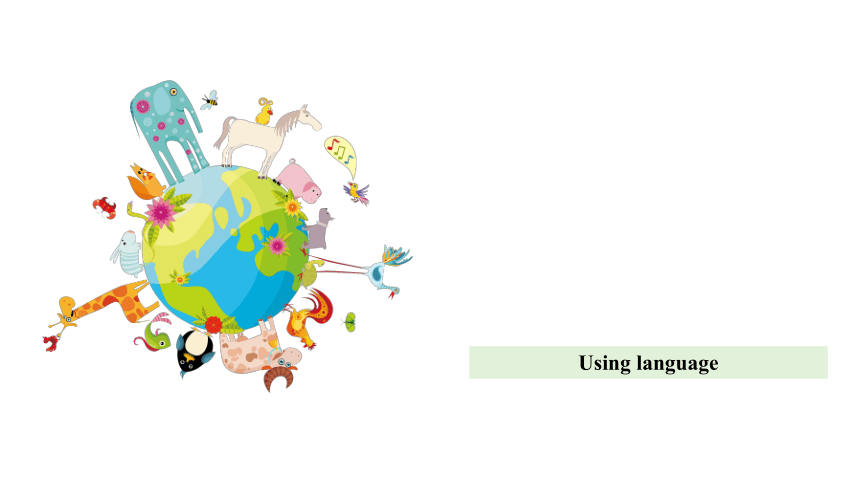 | |
| 格式 | pptx | ||
| 文件大小 | 38.0MB | ||
| 资源类型 | 教案 | ||
| 版本资源 | 外研版(2019) | ||
| 科目 | 英语 | ||
| 更新时间 | 2025-05-30 16:56:53 | ||
图片预览

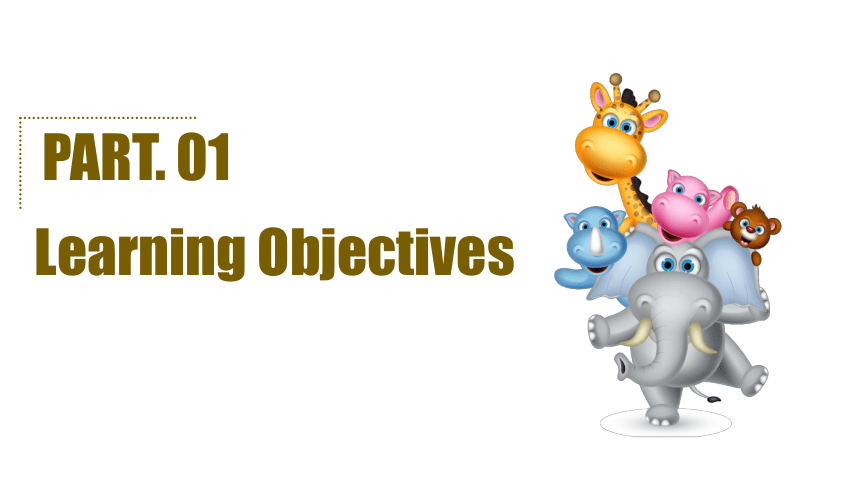
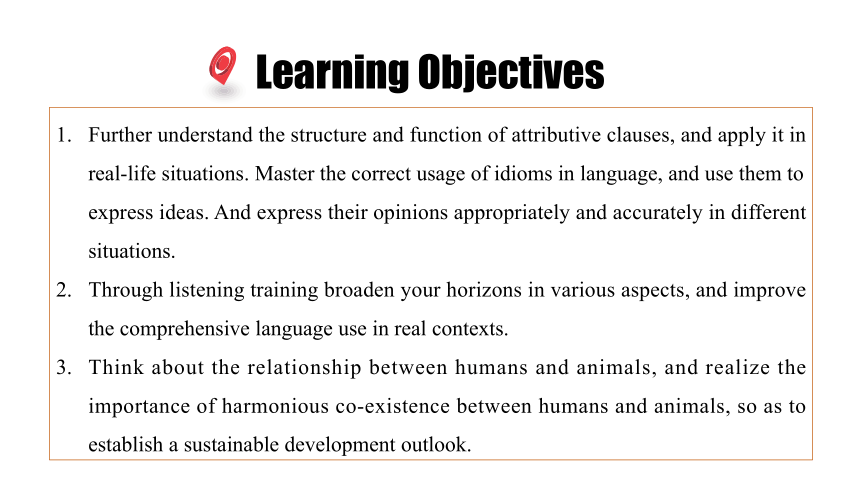
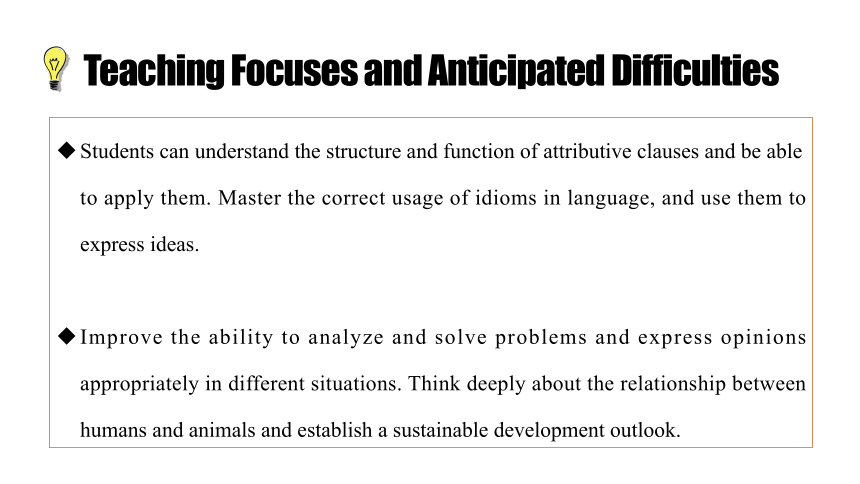
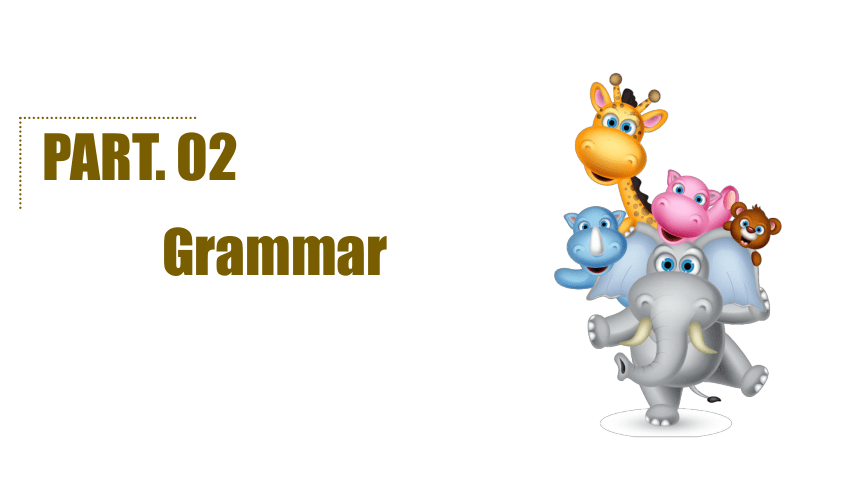
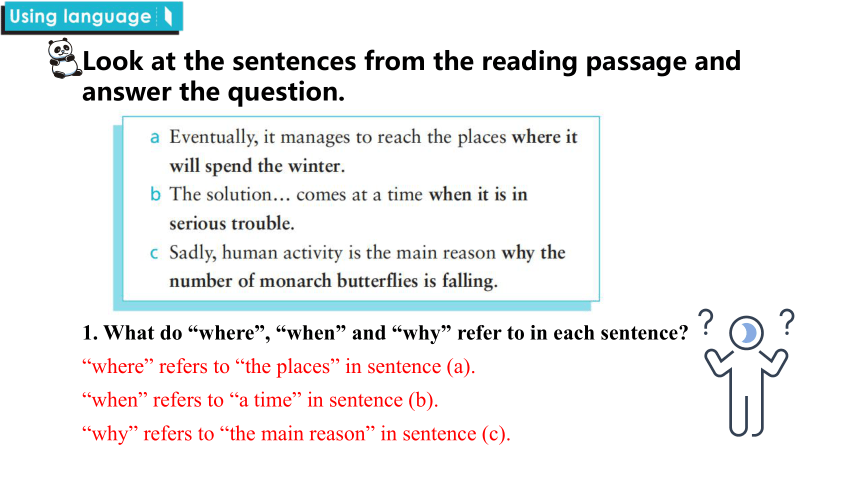

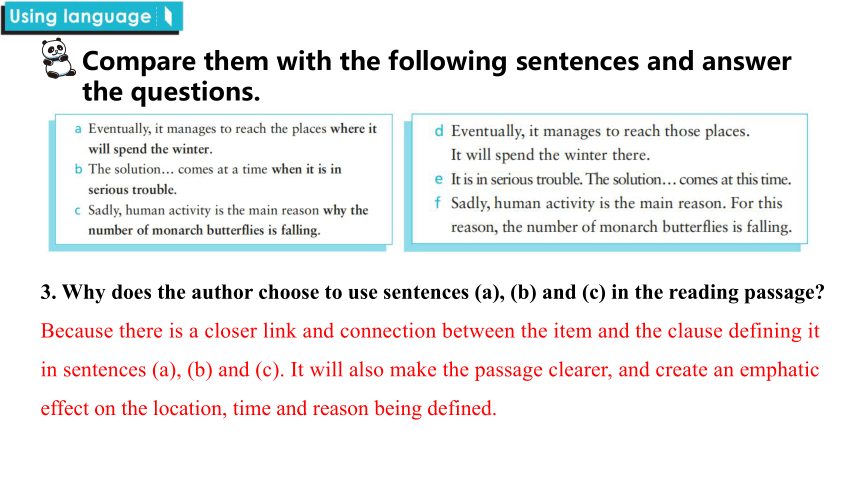
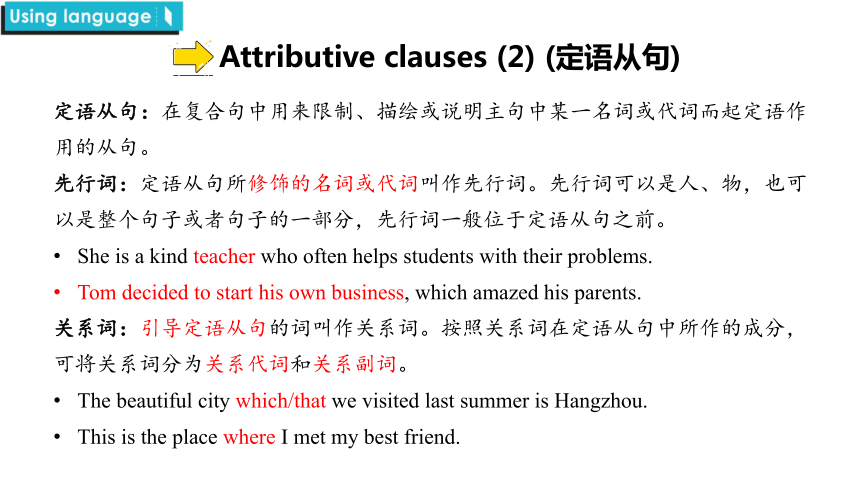
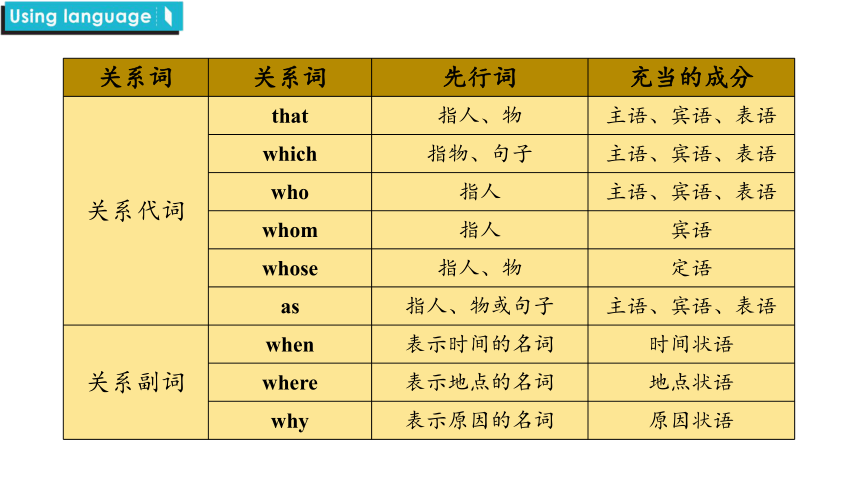
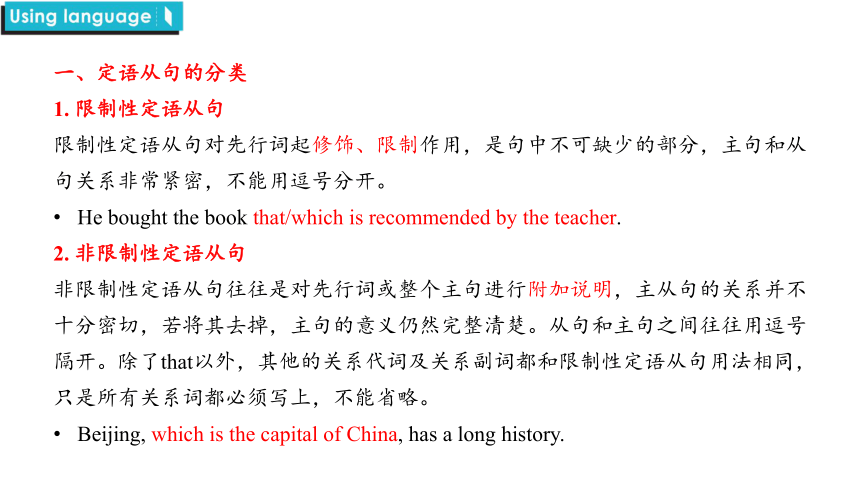
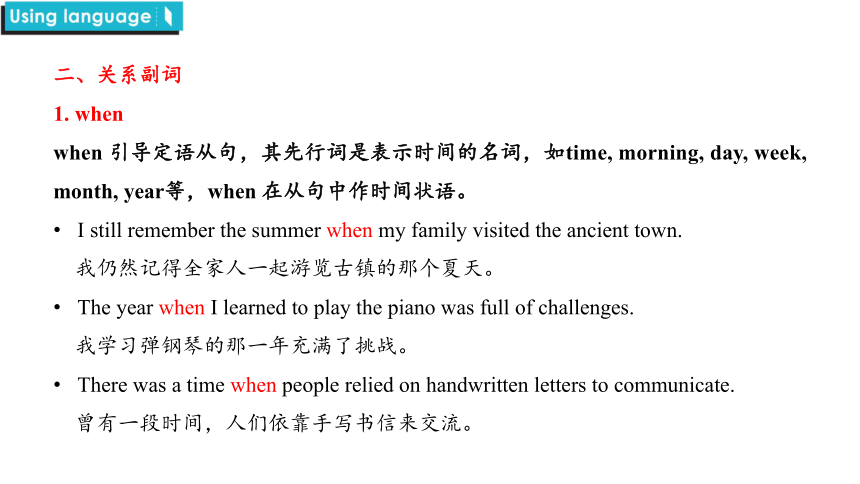
文档简介
(共37张PPT)
Using language
Unit 4
Friends
forever
Learning Objectives
PART. 01
Understand the daily study and life of British middle school students by watching videos. Based on your own daily study and life, compare the study and life in Chinese and British schools, and find out the similarities and differences between the two. Talk about your first impression of high school life, and have a preliminary perception of the study and life in the senior high school stage.
Learning Objectives
Further understand the structure and function of attributive clauses, and apply it in real-life situations. Master the correct usage of idioms in language, and use them to express ideas. And express their opinions appropriately and accurately in different situations.
Through listening training broaden your horizons in various aspects, and improve the comprehensive language use in real contexts.
Think about the relationship between humans and animals, and realize the importance of harmonious co-existence between humans and animals, so as to establish a sustainable development outlook.
Understand the daily study and life of British middle school students by watching videos. Based on your own daily study and life, compare the study and life in Chinese and British schools, and find out the similarities and differences between the two. Talk about your first impression of high school life, and have a preliminary perception of the study and life in the senior high school stage.
Teaching Focuses and Anticipated Difficulties
Students can understand the structure and function of attributive clauses and be able to apply them. Master the correct usage of idioms in language, and use them to express ideas.
Improve the ability to analyze and solve problems and express opinions appropriately in different situations. Think deeply about the relationship between humans and animals and establish a sustainable development outlook.
Grammar
PART. 02
Look at the sentences from the reading passage and answer the question.
1. What do “where”, “when” and “why” refer to in each sentence
“where” refers to “the places” in sentence (a).
“when” refers to “a time” in sentence (b).
“why” refers to “the main reason” in sentence (c).
Compare them with the following sentences and answer the questions.
2. What is the difference between the two groups of sentences
Sentences (a), (b) and (c) contain a clause defining a noun or pronoun in the sentence. Sentences (d), (e) and (f) are constructed with a pair of simple sentences, with one defining a noun or pronoun in the other sentence in each pair.
Compare them with the following sentences and answer the questions.
3. Why does the author choose to use sentences (a), (b) and (c) in the reading passage
Because there is a closer link and connection between the item and the clause defining it in sentences (a), (b) and (c). It will also make the passage clearer, and create an emphatic effect on the location, time and reason being defined.
Attributive clauses (2) (定语从句)
定语从句:在复合句中用来限制、描绘或说明主句中某一名词或代词而起定语作用的从句。
先行词:定语从句所修饰的名词或代词叫作先行词。先行词可以是人、物,也可以是整个句子或者句子的一部分,先行词一般位于定语从句之前。
She is a kind teacher who often helps students with their problems.
Tom decided to start his own business, which amazed his parents.
关系词:引导定语从句的词叫作关系词。按照关系词在定语从句中所作的成分,可将关系词分为关系代词和关系副词。
The beautiful city which/that we visited last summer is Hangzhou.
This is the place where I met my best friend.
关系词 关系词 先行词 充当的成分
关系代词 that 指人、物 主语、宾语、表语
which 指物、句子 主语、宾语、表语
who 指人 主语、宾语、表语
whom 指人 宾语
whose 指人、物 定语
as 指人、物或句子 主语、宾语、表语
关系副词 when 表示时间的名词 时间状语
where 表示地点的名词 地点状语
why 表示原因的名词 原因状语
一、定语从句的分类
1. 限制性定语从句
限制性定语从句对先行词起修饰、限制作用,是句中不可缺少的部分,主句和从句关系非常紧密,不能用逗号分开。
He bought the book that/which is recommended by the teacher.
2. 非限制性定语从句
非限制性定语从句往往是对先行词或整个主句进行附加说明,主从句的关系并不十分密切,若将其去掉,主句的意义仍然完整清楚。从句和主句之间往往用逗号隔开。除了that以外,其他的关系代词及关系副词都和限制性定语从句用法相同,只是所有关系词都必须写上,不能省略。
Beijing, which is the capital of China, has a long history.
二、关系副词
1. when
when 引导定语从句,其先行词是表示时间的名词,如time, morning, day, week, month, year等,when 在从句中作时间状语。
I still remember the summer when my family visited the ancient town.
我仍然记得全家人一起游览古镇的那个夏天。
The year when I learned to play the piano was full of challenges.
我学习弹钢琴的那一年充满了挑战。
There was a time when people relied on handwritten letters to communicate.
曾有一段时间,人们依靠手写书信来交流。
2. where
where引导定语从句,其先行词往往是表示地点的名词,如place, room, house, school, city等,where在从句中作地点状语。这里说的“地点”名词包含着:
①具体的地点,如place, house;
②抽象的地点,如case, stage, situation, position;
③隐性的地点,如news, story等。
The park where we often have picnics is very beautiful.
我们经常去野餐的那个公园非常漂亮。
We are in a situation where we have to make a quick decision.
我们处于一种必须迅速做出决定的情形中。
The story where the hero saves the village from danger is very inspiring.
那个英雄拯救村庄于危难之中的故事很鼓舞人心。
3. why
why引导定语从句,表示原因或理由,其先行词是reason。why在定语从句中作原因状语。
Can you tell me the reason why the train was delayed
你能告诉我火车晚点的原因吗?
Scientists are studying the reason why some plants can survive in extreme environments.
科学家们正在研究某些植物能在极端环境中存活的原因。
I don’t understand the reason why she suddenly stopped talking to me.
我不明白她为什么突然不和我说话了。
关系代词与关系副词的选用:
1. 若从句的谓语动词是及物动词,后面若无宾语,用关系代词;是不及物动词则用关系副词。
This is the museum which we explored last weekend.
I’ll never forget the year when I studied abroad.
2. 若关系词在从句中作主语或宾语,则用关系代词;若作状语,则用关系副词。
The novel that I borrowed from the library is fascinating.
This is the city where my dream began.
The reason why she left is still unknown.
Attention
1. 当先行词为situation, case, stage, point等抽象地点名词,且关系词在定语从句中作状语时,也要用关系副词where引导。
The company is in a situation where cost-cutting measures are necessary.
2. 如果先行词way后面的定语从句中缺少宾语,则用that/which或省略关系词。
The way (that/which) she solved the problem impressed us all.
3. 先行词occasion作“时机”讲时,用关系副词when;作“场合”讲时,用关系副词where。
There are occasions when silence is the best answer.
This is an occasion where formal dress is required.
4. 关系副词when, where可用于非限制性定语从句,而关系副词why不可以。
Attention
Read the passage and underline the words that where, when and why refer to.
In April 2017, two giant pandas from China arrived at a zoo in the Netherlands. There, they were welcomed to the Chinese-style compound where they were to live. On 30 May, after the preparations were complete, the day finally came when the pandas met their fans for the first time. People were excited – the zoo is the only place in the country where it is possible to see pandas. In fact, the last time there were pandas in the Netherlands was in 1987. And of course, the main reason why they were so excited is that pandas are just so cute!
Complete the email with where, when or why.
where
when
why
where
Look at the pictures and complete the idioms with animal names.
1
2
4
3
5
bee
birds
mice
horses
dogs
cats
Complete the paragraph with the animal idioms in
Activity 4.
English idioms are a way of adding colour to the language. For example, instead of saying “It’s raining heavily”, you could say “1_________________________”. Another reason to use idioms is that they are concise. For example, to describe someone who is always working or busy doing something, we can say they are 2________________. If they’re rushing into something and should wait and be patient, you could say “3__________________”. Learning idioms can be fun, especially when we compare them to Chinese equivalents. Take, for example, “4___________________________________” (people do what they want and have fun when someone in authority is absent) and “5____________________________” (solve two problems with one action) – are there corresponding idioms in Chinese
It’s raining cats and dogs.
as busy as a bee
hold your horses
When the cat’s away, the mice will play.
kill two birds with one stone
Work in pairs. Find more animal idioms. Choose an idiom and describe a situation with it.
A: She’s as busy as a bee.
B: What makes you say that
...
Love me, love my dog. 爱屋及乌。
Don’t ride the high horse.勿摆架子。
Never offer to teach fish to swim. 不要班门弄斧。
Fine feathers make fine birds. 人凭衣裳马凭鞍。
Listening
PART. 03
Dogs were first domesticated over 14,000 years ago. Sheep, cows and pigs have been kept at home as sources of food for around 7,000 years.
The oldest zoo in the world is in Vienna, opened in 1752. The oldest zoo in China is Beijing Zoo, which was founded in 1906.
Did You Know
Listen to the TV debate and choose the correct topic.
Can zoo animals survive in the wild
Can zoos offer animals their natural environment
Should we keep wild animals in the zoo
Should we educate people more about animals
Listen again and complete the mind map.
in danger of dying out
educate people about animals
natural environments
depend too much on humans
as good as
do more good for
Now talk about how the speakers express agreement and disagreement. Listen again if necessary.
Work in pairs. Hold a debate on whether we should keep animals as pets.
student A
You are in favour of keeping animals as pets. You have the following arguments:
Keeping pets develops a kind and caring attitude towards animals.
Keeping pets is good for people’s physical and mental health.
Keeping pets helps people know more about animals.
student B
You are against keeping animals as pets. You have the following arguments:
Caring for other people is more important than caring for animals.
It is bad for animals’ physical and mental health to be kept as pets.
Animals kept at home can cause trouble for neighbours.
Work in pairs. Hold a debate on whether we should keep animals as pets.
Work in pairs. Think of another topic that is related to animals and hold a debate.
Vocabulary
1. accommodation
accommodate v. 提供住宿(或膳宿、座位等);容纳
provide accommodations for 为……提供膳宿
accommodate/adapt (oneself) to 适应;使……适应……
例题:
During the peak tourist season, finding suitable ______________(accommodate) in popular destinations can be a challenge.
accommodation
Exercise
PART. 04
1. The university was f_________(创立) in 1900 and has a long-standing reputation.
2. Solar power is becoming an increasingly important s_______(来源) of renewable energy.
3. Teachers should use their a_________(权力) appropriately to maintain classroom discipline.
4. The author skillfully inserted various i______(习语) into the novel, adding cultural depth and local flavor to the story.
ounded
Exercise: 单词拼写
ource
uthority
dioms
1. The student _________ answered the question correctly won a prize.
2. The factory ______ my father worked for ten years has been closed down.
3. This is the reason ______ he didn’t come to the meeting yesterday.
4. The old man ______ house was broken into last night is very sad.
5. I still remember the time ______ we studied together in the same class.
6. The city _________ has a long history attracts many tourists every year.
7. There are 50 students in our class, most _________ are from the south.
8. ______ is known to all, the earth moves around the sun.
who/that
Exercise: 用合适的关系词填空
where
why
whose
when
which/that
of whom
As
Summary
PART. 05
Using language
Grammar
Vocabulary
Listening
定语从句
定语从句的分类
注意事项
关系副词
Homework
PART. 06
Review what you have learnt in this class;
Write a short passage to share your opinions on whether we should keep animals as pets.
Homework
See you next class!
Using language
Unit 4
Friends
forever
Learning Objectives
PART. 01
Understand the daily study and life of British middle school students by watching videos. Based on your own daily study and life, compare the study and life in Chinese and British schools, and find out the similarities and differences between the two. Talk about your first impression of high school life, and have a preliminary perception of the study and life in the senior high school stage.
Learning Objectives
Further understand the structure and function of attributive clauses, and apply it in real-life situations. Master the correct usage of idioms in language, and use them to express ideas. And express their opinions appropriately and accurately in different situations.
Through listening training broaden your horizons in various aspects, and improve the comprehensive language use in real contexts.
Think about the relationship between humans and animals, and realize the importance of harmonious co-existence between humans and animals, so as to establish a sustainable development outlook.
Understand the daily study and life of British middle school students by watching videos. Based on your own daily study and life, compare the study and life in Chinese and British schools, and find out the similarities and differences between the two. Talk about your first impression of high school life, and have a preliminary perception of the study and life in the senior high school stage.
Teaching Focuses and Anticipated Difficulties
Students can understand the structure and function of attributive clauses and be able to apply them. Master the correct usage of idioms in language, and use them to express ideas.
Improve the ability to analyze and solve problems and express opinions appropriately in different situations. Think deeply about the relationship between humans and animals and establish a sustainable development outlook.
Grammar
PART. 02
Look at the sentences from the reading passage and answer the question.
1. What do “where”, “when” and “why” refer to in each sentence
“where” refers to “the places” in sentence (a).
“when” refers to “a time” in sentence (b).
“why” refers to “the main reason” in sentence (c).
Compare them with the following sentences and answer the questions.
2. What is the difference between the two groups of sentences
Sentences (a), (b) and (c) contain a clause defining a noun or pronoun in the sentence. Sentences (d), (e) and (f) are constructed with a pair of simple sentences, with one defining a noun or pronoun in the other sentence in each pair.
Compare them with the following sentences and answer the questions.
3. Why does the author choose to use sentences (a), (b) and (c) in the reading passage
Because there is a closer link and connection between the item and the clause defining it in sentences (a), (b) and (c). It will also make the passage clearer, and create an emphatic effect on the location, time and reason being defined.
Attributive clauses (2) (定语从句)
定语从句:在复合句中用来限制、描绘或说明主句中某一名词或代词而起定语作用的从句。
先行词:定语从句所修饰的名词或代词叫作先行词。先行词可以是人、物,也可以是整个句子或者句子的一部分,先行词一般位于定语从句之前。
She is a kind teacher who often helps students with their problems.
Tom decided to start his own business, which amazed his parents.
关系词:引导定语从句的词叫作关系词。按照关系词在定语从句中所作的成分,可将关系词分为关系代词和关系副词。
The beautiful city which/that we visited last summer is Hangzhou.
This is the place where I met my best friend.
关系词 关系词 先行词 充当的成分
关系代词 that 指人、物 主语、宾语、表语
which 指物、句子 主语、宾语、表语
who 指人 主语、宾语、表语
whom 指人 宾语
whose 指人、物 定语
as 指人、物或句子 主语、宾语、表语
关系副词 when 表示时间的名词 时间状语
where 表示地点的名词 地点状语
why 表示原因的名词 原因状语
一、定语从句的分类
1. 限制性定语从句
限制性定语从句对先行词起修饰、限制作用,是句中不可缺少的部分,主句和从句关系非常紧密,不能用逗号分开。
He bought the book that/which is recommended by the teacher.
2. 非限制性定语从句
非限制性定语从句往往是对先行词或整个主句进行附加说明,主从句的关系并不十分密切,若将其去掉,主句的意义仍然完整清楚。从句和主句之间往往用逗号隔开。除了that以外,其他的关系代词及关系副词都和限制性定语从句用法相同,只是所有关系词都必须写上,不能省略。
Beijing, which is the capital of China, has a long history.
二、关系副词
1. when
when 引导定语从句,其先行词是表示时间的名词,如time, morning, day, week, month, year等,when 在从句中作时间状语。
I still remember the summer when my family visited the ancient town.
我仍然记得全家人一起游览古镇的那个夏天。
The year when I learned to play the piano was full of challenges.
我学习弹钢琴的那一年充满了挑战。
There was a time when people relied on handwritten letters to communicate.
曾有一段时间,人们依靠手写书信来交流。
2. where
where引导定语从句,其先行词往往是表示地点的名词,如place, room, house, school, city等,where在从句中作地点状语。这里说的“地点”名词包含着:
①具体的地点,如place, house;
②抽象的地点,如case, stage, situation, position;
③隐性的地点,如news, story等。
The park where we often have picnics is very beautiful.
我们经常去野餐的那个公园非常漂亮。
We are in a situation where we have to make a quick decision.
我们处于一种必须迅速做出决定的情形中。
The story where the hero saves the village from danger is very inspiring.
那个英雄拯救村庄于危难之中的故事很鼓舞人心。
3. why
why引导定语从句,表示原因或理由,其先行词是reason。why在定语从句中作原因状语。
Can you tell me the reason why the train was delayed
你能告诉我火车晚点的原因吗?
Scientists are studying the reason why some plants can survive in extreme environments.
科学家们正在研究某些植物能在极端环境中存活的原因。
I don’t understand the reason why she suddenly stopped talking to me.
我不明白她为什么突然不和我说话了。
关系代词与关系副词的选用:
1. 若从句的谓语动词是及物动词,后面若无宾语,用关系代词;是不及物动词则用关系副词。
This is the museum which we explored last weekend.
I’ll never forget the year when I studied abroad.
2. 若关系词在从句中作主语或宾语,则用关系代词;若作状语,则用关系副词。
The novel that I borrowed from the library is fascinating.
This is the city where my dream began.
The reason why she left is still unknown.
Attention
1. 当先行词为situation, case, stage, point等抽象地点名词,且关系词在定语从句中作状语时,也要用关系副词where引导。
The company is in a situation where cost-cutting measures are necessary.
2. 如果先行词way后面的定语从句中缺少宾语,则用that/which或省略关系词。
The way (that/which) she solved the problem impressed us all.
3. 先行词occasion作“时机”讲时,用关系副词when;作“场合”讲时,用关系副词where。
There are occasions when silence is the best answer.
This is an occasion where formal dress is required.
4. 关系副词when, where可用于非限制性定语从句,而关系副词why不可以。
Attention
Read the passage and underline the words that where, when and why refer to.
In April 2017, two giant pandas from China arrived at a zoo in the Netherlands. There, they were welcomed to the Chinese-style compound where they were to live. On 30 May, after the preparations were complete, the day finally came when the pandas met their fans for the first time. People were excited – the zoo is the only place in the country where it is possible to see pandas. In fact, the last time there were pandas in the Netherlands was in 1987. And of course, the main reason why they were so excited is that pandas are just so cute!
Complete the email with where, when or why.
where
when
why
where
Look at the pictures and complete the idioms with animal names.
1
2
4
3
5
bee
birds
mice
horses
dogs
cats
Complete the paragraph with the animal idioms in
Activity 4.
English idioms are a way of adding colour to the language. For example, instead of saying “It’s raining heavily”, you could say “1_________________________”. Another reason to use idioms is that they are concise. For example, to describe someone who is always working or busy doing something, we can say they are 2________________. If they’re rushing into something and should wait and be patient, you could say “3__________________”. Learning idioms can be fun, especially when we compare them to Chinese equivalents. Take, for example, “4___________________________________” (people do what they want and have fun when someone in authority is absent) and “5____________________________” (solve two problems with one action) – are there corresponding idioms in Chinese
It’s raining cats and dogs.
as busy as a bee
hold your horses
When the cat’s away, the mice will play.
kill two birds with one stone
Work in pairs. Find more animal idioms. Choose an idiom and describe a situation with it.
A: She’s as busy as a bee.
B: What makes you say that
...
Love me, love my dog. 爱屋及乌。
Don’t ride the high horse.勿摆架子。
Never offer to teach fish to swim. 不要班门弄斧。
Fine feathers make fine birds. 人凭衣裳马凭鞍。
Listening
PART. 03
Dogs were first domesticated over 14,000 years ago. Sheep, cows and pigs have been kept at home as sources of food for around 7,000 years.
The oldest zoo in the world is in Vienna, opened in 1752. The oldest zoo in China is Beijing Zoo, which was founded in 1906.
Did You Know
Listen to the TV debate and choose the correct topic.
Can zoo animals survive in the wild
Can zoos offer animals their natural environment
Should we keep wild animals in the zoo
Should we educate people more about animals
Listen again and complete the mind map.
in danger of dying out
educate people about animals
natural environments
depend too much on humans
as good as
do more good for
Now talk about how the speakers express agreement and disagreement. Listen again if necessary.
Work in pairs. Hold a debate on whether we should keep animals as pets.
student A
You are in favour of keeping animals as pets. You have the following arguments:
Keeping pets develops a kind and caring attitude towards animals.
Keeping pets is good for people’s physical and mental health.
Keeping pets helps people know more about animals.
student B
You are against keeping animals as pets. You have the following arguments:
Caring for other people is more important than caring for animals.
It is bad for animals’ physical and mental health to be kept as pets.
Animals kept at home can cause trouble for neighbours.
Work in pairs. Hold a debate on whether we should keep animals as pets.
Work in pairs. Think of another topic that is related to animals and hold a debate.
Vocabulary
1. accommodation
accommodate v. 提供住宿(或膳宿、座位等);容纳
provide accommodations for 为……提供膳宿
accommodate/adapt (oneself) to 适应;使……适应……
例题:
During the peak tourist season, finding suitable ______________(accommodate) in popular destinations can be a challenge.
accommodation
Exercise
PART. 04
1. The university was f_________(创立) in 1900 and has a long-standing reputation.
2. Solar power is becoming an increasingly important s_______(来源) of renewable energy.
3. Teachers should use their a_________(权力) appropriately to maintain classroom discipline.
4. The author skillfully inserted various i______(习语) into the novel, adding cultural depth and local flavor to the story.
ounded
Exercise: 单词拼写
ource
uthority
dioms
1. The student _________ answered the question correctly won a prize.
2. The factory ______ my father worked for ten years has been closed down.
3. This is the reason ______ he didn’t come to the meeting yesterday.
4. The old man ______ house was broken into last night is very sad.
5. I still remember the time ______ we studied together in the same class.
6. The city _________ has a long history attracts many tourists every year.
7. There are 50 students in our class, most _________ are from the south.
8. ______ is known to all, the earth moves around the sun.
who/that
Exercise: 用合适的关系词填空
where
why
whose
when
which/that
of whom
As
Summary
PART. 05
Using language
Grammar
Vocabulary
Listening
定语从句
定语从句的分类
注意事项
关系副词
Homework
PART. 06
Review what you have learnt in this class;
Write a short passage to share your opinions on whether we should keep animals as pets.
Homework
See you next class!
